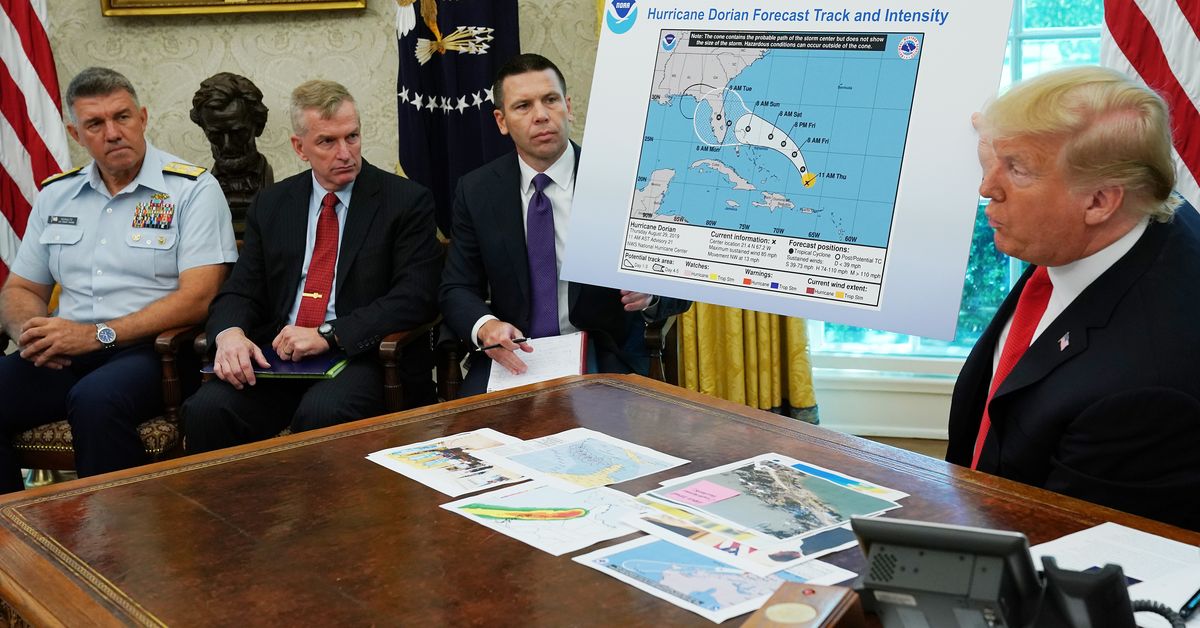
Hurricane Dorian has moved out to sea, but a gale is still raging at the National Oceanic and Atmospheric Administration (NOAA). In a forceful email sent to staff on Sunday night, Craig McLean, the chief scientist of NOAA, took on anonymous members of his own organization who may have “violated NOAA’s policies of scientific integrity.” McLean vowed to pursue truths in a long saga involving President Trump, Hurricane Dorian, a Sharpie, a forecaster in Alabama, and an anonymous — and potentially coerced — press release.
This all started on September 1st, when President Trump tweeted that Alabama would be among the states most likely to be “hit (much) harder than anticipated.” It, in fact, was not.
Twenty minutes later, the National Weather Service in Alabama tweeted its response: “Alabama will NOT see any impacts from #Dorian. We repeat, no impacts from Hurricane #Dorian will be felt across Alabama. The system will remain too far east.”
Forecasters at one point thought Dorian might make landfall in Florida, but instead the storm battered the Bahamas, and grazed much of the East Coast of North America before slamming into Nova Scotia and heading out to sea.
At no point did it present a risk to Alabama in the way Trump claimed it would. The National Weather Service forecast around the time of Trump’s tweet indicated about a 5 percent chance of tropical-force winds for a small corner of Alabama, a far cry from Trump’s warning that it would be “hit (much) harder.”
Nevertheless, Trump doubled down on the misinformation. He brandished an outdated National Hurricane Center map that appeared to have been drawn on with a Sharpie to falsely extend the path of the storm further into Alabama. He repeated falsehoods about Dorian at a press conference on opioids. The White House even issued a statement from a rear admiral backing up the president.
But the body blow to the NWS came on Friday evening, when its parent agency, NOAA, issued an unsigned press release saying that it had provided information to Trump and the public “that tropical-storm-force winds from Hurricane Dorian could impact Alabama.” The anonymous letter even scolded the Birmingham, Alabama National Weather Service for clapping back at Trump on Twitter on September 1st, saying that the tweet “spoke in absolute terms that were inconsistent with probabilities from the best forecast products available at the time.”
According to a report by The New York Times, the surprising press release was the result of threats from the secretary of commerce, who threatened that he would fire top officials at NOAA if they didn’t fall in line with the president.
Current NOAA employees were furious at the press release, and acting chief scientist McLean seemed to put many of those frustrations into words on Sunday.
“My understanding is that this intervention to contradict the forecaster was not based on science but on external factors including reputation and appearance, or simply put, political,” McLean said of the press release in his email. “The content of this press release is very concerning as it compromises the ability of NOAA to convey life-saving information necessary to avoid substantial and specific danger to public health and safety.”
The press release from NOAA also immediately drew ire from the broader weather community and former NOAA administrators. “The anonymous and disingenuous statement NOAA tweeted out is a major breach of scientific integrity that damages the NWS and stains the agency’s leadership,” Kathryn Sullivan, who headed the agency under the Obama administration, told The Washington Post.
McLean, in his email, praised the NWS’s forecasters who, he added, “provide the benefit of their own experience in announcing accurate forecasts accompanied by the distinction of all credible scientists — they sign their work.”
Accurate and trustworthy forecasts are important not only because they help prepare for the storm, they also avoid unnecessary panic in places that won’t actually be threatened.
McLean wrote that he will continue to look into how his agency’s Administrative Order on Scientific Integrity might have been violated. “Our NOAA Scientific Integrity Policy and Code of Scientific Conduct make clear that all NOAA employees shall approach all scientific activities with honesty, objectively, and completely, without allegiance to individuals, organizations, or ideology,” he said.
https://www.theverge.com/2019/9/9/20857596/noaa-chief-scientist-investigate-sharpiegate-trump-dorian-alabama

